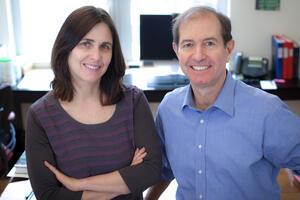MIT’s Shafi Goldwasser wins “the Nobel Prize in computing”
Professor Shafi Goldwasser first met her MIT colleague Prof. Silvio Micali when they were graduate students at the University of California at Berkeley in 1980. They shared a mentor and thesis advisor, Prof. Manuel Blum, and they also shared a passionate interest in cryptology, the science of codes. One of their projects involved finding a way to play a game of poker securely over the phone. From this, the two devised a method for encrypting and ensuring the security of single bits of data. This original research led to award-winning careers for the pair.
On June 15, 2013, the two professors were awarded “the Nobel Prize in computing,” the Alan M. Turing Award presented by the Association for Computing Machinery (ACM). Named for the British mathematician who defined the mathematical foundation of computing and helped break the German Enigma code during World War II, the ACM is the world’s largest educational and scientific computing society.
Goldwasser and Micali created new mechanisms for how information is encrypted and secured, work that is fundamental to today’s communications protocols, Internet transactions, and cloud computing. The ACM credited them with “revolutionizing the science of cryptology” and with developing the gold standard for enabling secure Internet transactions.
Born in New York in 1958, Goldwasser is the RSA Professor of Electrical Engineering and Computer Science at MIT and a professor of computer science and applied mathematics at the Weizmann Institute of Science in Israel. She leads the Theory of Computation Group at MIT’s Computer Science and Artificial Intelligence Laboratory (CSAIL).
“Our work was very unconventional at the time,” Goldwasser said. “We were graduate students and let our imagination run free, from using randomized methods to encrypt single bits to enlarging the classical definition of a proof to allow a small error to setting new goals for security. Winning the award is further testimony to the fact that the cryptographic and complexity theoretic community embraced these ideas in the last 30 years.”
Among other Turing Award winners are the professors’ Berkeley mentor Manuel Blum and their MIT colleague Barbara Liskov.
More details about the work of Profs. Goldwasser and Micali are given in this article from MIT.
In this video from the American Academy of Arts & Sciences, Prof. Goldwasser comments on a scene from “Breaking the Code,” a play about Alan Turing by Hugh Whitemore, presented on March 15, 2011, two years before winning the award named for him.
Sources: “Shafi Goldwasser;” “MIT Researchers’ Innovations Became Gold Standard for Enabling Secure Internet Transactions,” ACM; “Alan Turing,” BBC; “Goldwasser and Micali win Turing Award,” MIT News.



